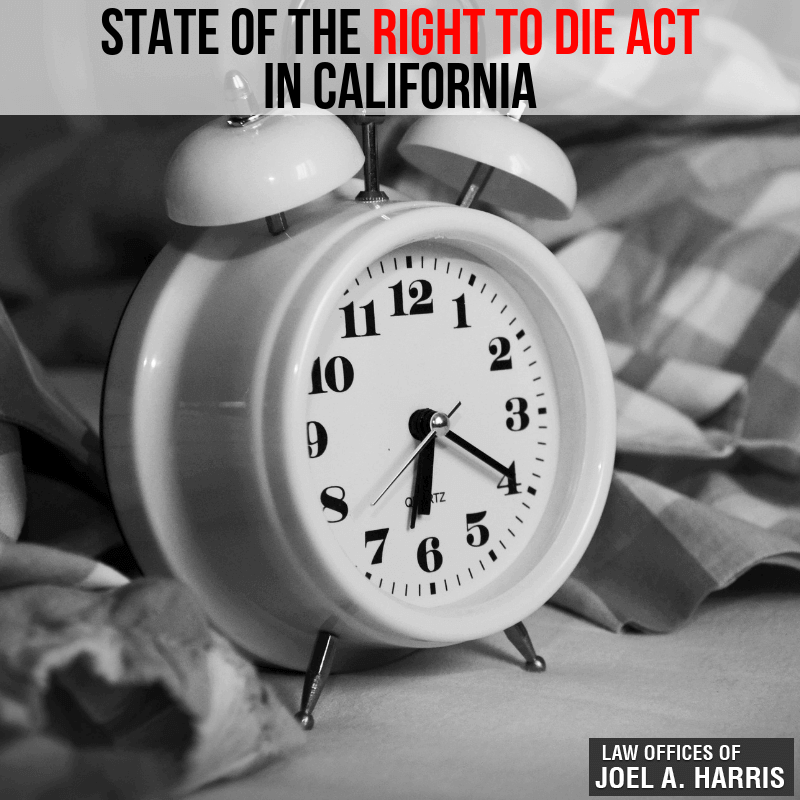State of the Right to Die Act in California (aka End of Life Option Act)

The End of Life Option Act allows adults diagnosed with terminal diseases to request aid-in-dying drugs from their physician. There are certain requirements said person must meet in order to qualify for such a request. The requestee must be 18, a California resident, have a diagnosis of a terminal disease, be able to make their own medical decisions, and be able to self-administer the drug with no assistance from others. The Act, filled with pros and cons, will also require the physician to submit paperwork to the California Department of Public Health (CDPH), or the department of health of their specified state. In this article we break down the act and what it means to Californians and their loved ones.
1. The Act Was Created Four Years Ago
The act was enacted in October 2015, making California the fifth state to allow physicians to prescribe these drugs, also referred to as physician-assisted suicide. It is notable that Governor Jerry Brown put it into effect in June of 2016, eight months after its original creation, due to it being passed during a special session. Brown’s main motive was feeling unable to deny the right of choice to anyone who wanted to carry out their own decision as quickly as possible.
“The act was enacted in October 2015, making California the fifth state to allow physicians to prescribe these drugs, also referred to as physician-assisted suicide.”
2. The Act Has Been Subject to Controversy
Since its initial adoption, the End of Life Option Act has stirred controversy due to its supposed lack of ethics. On May 15, 2018, Superior Court Judge Daniel Ottolia issued a temporary appeal to the act, stating that it was irregularly passed. According to the appeal, the act is not directly related to the healthcare issues it was slated to be passed to aid, making its claims invalid. Xavier Becerra appealed this ruling, asking the act to be in effect until the matter was completed running through court. For the next month, Becerra and Ottolia simultaneously appealed one another’s rulings; this battle ended on June 15th when California’s Court of Appeals granted the state’s request to continue to fund the ELOA while the case was being considered.
3. As Of Now, The Act is In Effect
In November, the state appeals court rejected yet another appeal to the act, stating that its nature and motives should allow it to be left in effect. On January 8, 2019, opponents of the act asked the superior court to reconsider their support of the act, stating that its fine print is unconstitutional. This appeal was ultimately unsuccessful, as twenty days later the California AG asked the court to deny their appeal. Overall, despite its uncertain future, it is fairly certain that supporters of the multifaceted act will continue to fight for it and those who oppose it will continue to do so.
Are You Worried about Your End of Life Plan?
If you are not prepared with a current estate plan then your family could be vulnerable to higher tax bills, extensive legal fees, and familial conflicts. To avoid those obstacles you should visit an Estate Planning Attorney to get professional help, and create a plan that well suits your goals.
At The Law Offices of Joel A Harris located in the cities of Concord, Walnut Creek, Antioch, California, we have worked for over 25 years giving the best guidance our clients need to protect their assets. Have a question about your planning your estate? Feel free to schedule a sit-down meeting where we are happy to patiently answer every question you may have. For your free consultation reach out to us at (925) 757-4605.
Sources
- https://www.deathwithdignity.org/states/california/
- https://www.sfchronicle.com/bayarea/article/California-s-right-to-die-law-upheld-by-state-13426626.php
- https://en.wikipedia.org/wiki/California_End_of_Life_Option_Act
- https://coalitionccc.org/tools-resources/end-of-life-option-act/
- https://www.cdph.ca.gov/Programs/CHSI/Pages/End-of-Life-Option-Act-.aspx
